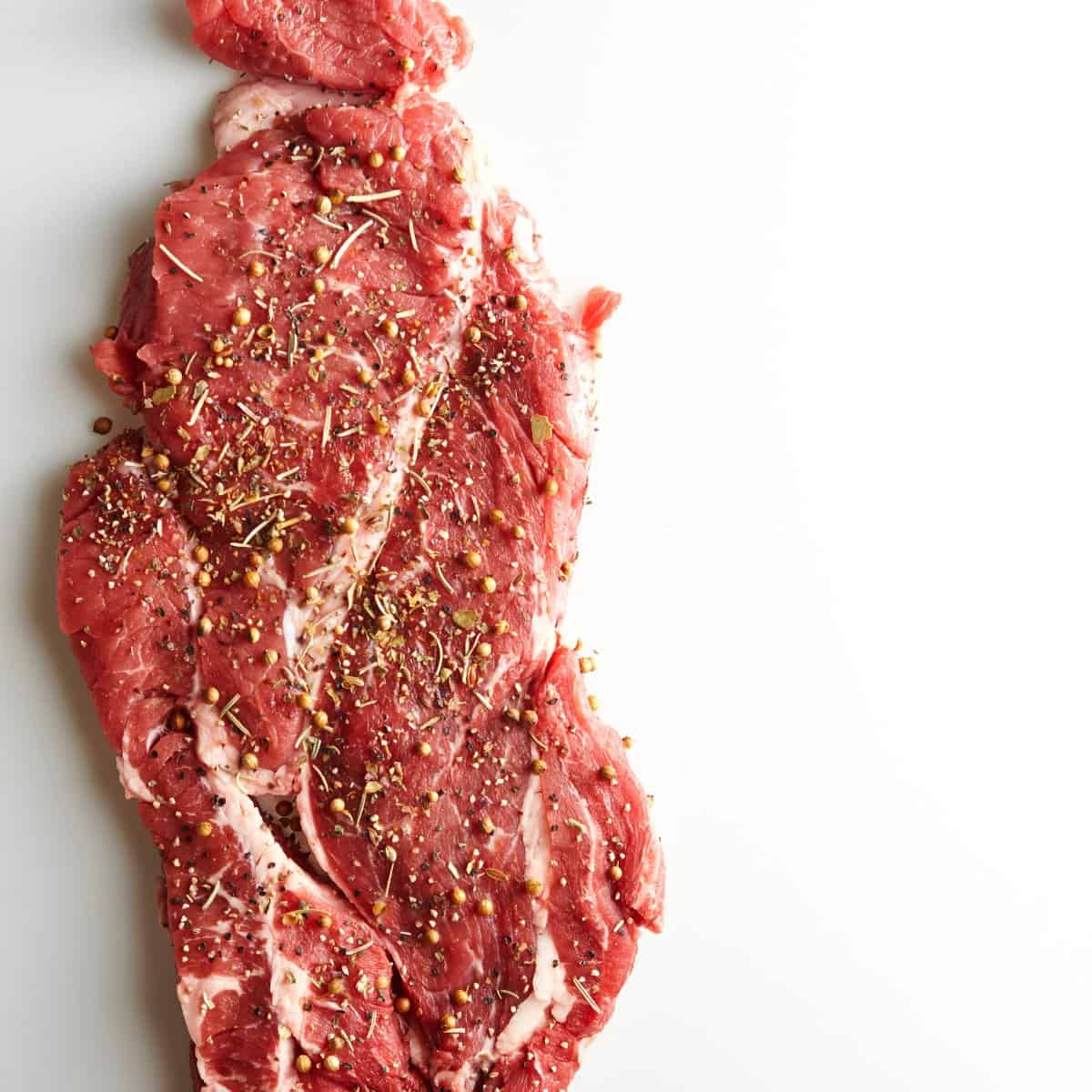What Does Seasoning Mean? A Guide to Different Types and When to Use Them
What does seasoning mean?
Seasoning is the process of adding salt, herbs, or spices to food to enhance the flavor. The word comes from the Old French “seisoner,” meaning “to salt.” The meaning has evolved over time.
It’s important to season food properly so it doesn’t taste bland or tasteless. The right seasoning can make a dish delicious, so let’s look at how to do that.


Check out our new cookbook
Bitemybun's family recipes with complete meal planner and recipe guide.
Try it out for free with Kindle Unlimited:
Read for freeIn this post we'll cover:
What Does Seasoning Really Mean?
Seasoning is a term used in cooking that refers to the process of adding natural flavorings to food to enhance its taste. This can be done in a variety of ways, depending on the type of dish being prepared and the ingredients being used. Seasoning can be added during the cooking process, or it can be used as a finishing touch to bring out the flavors of a dish.
What is Included in Seasoning?
The term “seasoning” usually includes a variety of common ingredients that are used to improve the flavor of a dish. These can include:
- Salt: One of the most common seasonings used in cooking, salt is used to enhance the natural flavors of meat, vegetables, and other foods.
- Herbs: Aromatic plants used in cooking, such as basil, thyme, and rosemary, are often used to add flavor to dishes.
- Spices: Dried seeds, roots, and other parts of plants that are used to add flavor to food. Common spices include pepper, cinnamon, and ginger.
- Aromatic vegetables: Fresh ingredients like onion, garlic, and ginger can be used to add flavor to dishes.
- Seasonings: A mixture of herbs, spices, and other flavorings used to enhance the flavor of a dish. Common seasonings include Italian seasoning, Cajun seasoning, and curry powder.
- Oil: Used to enhance the flavor of a dish and to prevent food from sticking to the pan.
- Sauce: A liquid mixture used to add flavor to a dish. Common sauces include tomato sauce, soy sauce, and Worcestershire sauce.
- Lemon: Used to add a tangy flavor to dishes, lemon is a common seasoning in many recipes.
- Bay leaves: A pungent herb that is often used in soups and stews to add flavor.
How Seasoning Can Affect the Flavor of a Dish
The type of seasoning used in a dish can greatly affect its flavor. Depending on the choice of seasoning, it can:
- Bring out the natural flavors of meat, vegetables, and other foods.
- Enhance the flavor of a dish by adding new and interesting flavors.
- Change the flavor of a dish by adding a new and different taste.
- Add a pungent or spicy flavor to a dish.
- Add a seasonal touch to a dish by using seasonal ingredients.
How Seasoning is Obtained
Seasoning can be obtained in a variety of ways, depending on the type of seasoning being used. Some common ways to obtain seasoning include:
- Dried herbs and spices: These can be found in most grocery stores and are often sold in small jars or packets.
- Fresh herbs and spices: These can be found in the produce section of most grocery stores and can be used to add a fresh and aromatic flavor to dishes.
- Seasoning blends: These can be found in most grocery stores and are a mixture of herbs, spices, and other flavorings.
- House seasonings: These are often used in restaurants and are a mixture of herbs, spices, and other flavorings that are unique to that restaurant.
- Making your own seasoning: This can be done by mixing together herbs, spices, and other flavorings to create a unique seasoning blend.
Why Seasoning is the Secret Ingredient to Delicious Dishes
Seasoning is not just about adding salt and pepper to your dish. It means intensifying the flavor of your food by changing the taste of the ingredients. Adding the right amount of seasoning can make a dish go from bland to delicious. It’s the main thing that separates a good chef from a great one.
Marriage of Flavors
Seasoning is not just about adding taste, but also about marrying flavors. A good seasoning mix can bring out the natural flavors of the ingredients and create a deep, flavorsome taste. For example, adding a bit of lemon juice can add a tangy acid that marries well with the other flavors in the dish.
Slow Cooking and Seasoning
Seasoning is not just about adding things at the end. It’s also about adding things at the right stage of cooking. For example, when cooking meat, adding salt and pepper early on can help the seasoning spread throughout the meat. Slow-cooked dishes also benefit from seasoning at different times to allow the flavors to develop over a long period.
Preferences and Excess
Seasoning is not just about adding a set amount of salt and pepper. People have different preferences when it comes to seasoning, and it’s important to adjust the seasoning to your taste. It’s also important not to add too much seasoning, as excess can ruin a dish. A good chef knows when to stop adding seasoning.
Table Seasoning
Seasoning is not just about what’s added during cooking. It’s also about what’s added at the table. Some dishes are considered sweet and need a bit of extra salt to balance out the flavors. Others may need a bit of extra pepper to give it a kick. Table seasoning is a common practice and allows people to adjust the seasoning to their taste.
Timing is Everything: When to Add Seasoning to Your Dish
Seasoning is a crucial part of cooking that can make or break a dish. Adding it at the right time can enhance and intensify the flavor, while adding it too early or too late can result in a bland or overpowering taste. Here are some tips on when to add seasoning to your dish:
When Cooking Meat
- For beef or fish, it’s best to season them before cooking to draw out the moisture and develop a crispy crust.
- For curing meat, seasoning is usually added directly to the ingredients to help preserve the meat and add flavor.
- When making a sauce, it’s common to add seasoning towards the end of cooking to adjust the taste and bring out the flavors of the other ingredients.
When Working with Spices
- Spices can be added at the beginning of cooking to draw out their flavors and create a base for the dish.
- However, some spices can lose their flavor over time, so it’s best to add them towards the end of cooking to ensure their taste is still present.
When Following a Recipe
- Depending on the recipe, seasoning can be added at different stages of cooking. It’s important to follow the guide provided to ensure the best flavor.
- Some recipes may call for seasoning to be added in layers, gradually building up the flavor.
When Experimenting with New Flavors
- When trying out a new seasoning or spice, it’s best to start with a small amount and gradually add more to adjust the taste.
- It’s also important to keep in mind the firmness of the ingredients, as softer ingredients may require less seasoning than firmer ones.
Exploring the World of Seasonings
When it comes to cooking meat, seasoning is a crucial step to improve the flavor and texture of the dish. Here are some common seasonings used for meat:
- Salt and Pepper: The most popular and basic seasoning for meat, salt draws out the moisture and intensifies the flavor while pepper adds a subtle kick.
- Lemon Juice: A natural acid that can tenderize meat and add a tangy flavor.
- Rubs: A mixture of herbs and spices rubbed onto the meat before cooking to develop richer flavors and tenderize the meat.
- Vinegars: Used to magnify the flavors of the meat and extend the shelf life by curing and preserving it.
Seasonings for Fish
Fish is a delicate protein that requires a different set of rules when it comes to seasoning. Here are some seasonings that work well with fish:
- Citrus: Lemon, lime, and orange can add a bright and refreshing flavor to fish dishes.
- Herbs: Dill, parsley, and thyme are popular herbs that can subtly adjust the flavor of fish without overpowering it.
- Sauces: A variety of sauces can be added to fish dishes, such as tartar sauce, soy sauce, or a simple butter and lemon sauce.
Conclusion
So, seasoning means adding flavor to food to enhance the taste. It can be done in many ways, using a variety of ingredients, depending on the dish you’re preparing. Seasoning is a secret ingredient that makes a delicious dish taste even better. So, don’t be afraid to season your food!
Check out our new cookbook
Bitemybun's family recipes with complete meal planner and recipe guide.
Try it out for free with Kindle Unlimited:
Read for freeJoost Nusselder, the founder of Bite My Bun is a content marketer, dad and loves trying out new food with Japanese food at the heart of his passion, and together with his team he's been creating in-depth blog articles since 2016 to help loyal readers with recipes and cooking tips.
